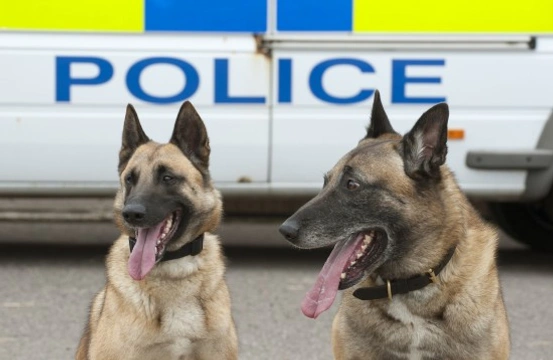
How do police and military dogs interact with their handlers and trainers?
Any dog owner can tell you that the bond they have with their dog is very strong, and that caring for and living with a dog creates a very real and very deep relationship. This is even more true of working dogs and their handlers, particularly within jobs where the dog and the handler rely heavily upon each other in high pressure and potentially dangerous situations, such as is the case with working police and military dogs.
This relationship requires a greatly heightened level of communication and understanding between the dog and their handler, something that is even more interesting when you consider that working dogs are usually housed in kennelling and not in their handler’s home, and may sometimes have to work with different handlers rather than just the one.
In this article, we will look at how high-level working dogs such as those in the police and the military work with and communicate with their handlers.
From the beginning
Police and military dogs usually begin training and assessment for suitability from a very early age, and in some cases, special kennels breed dogs specifically with the intent of raising future working dogs! In most situations, a dog is paired with their prospective future handler when young, and the two work together with an instructor to train them both simultaneously. The aim of training a dog and a handler together is that the two will form a strong bond and have a lot of trust between them, and that they will remain together for the duration of the dog’s working life. After the dog becomes too old to work effectively, they are almost always adopted as a pet by their handler rather than re-homed.
However, career changes and changes in circumstances such as promotions and other events dictate that it is not always possible for a dog to remain with one handler for their entire working life, and they must also be able to work properly with other handlers on occasion, and sometimes, get a new handler entirely.
The working role
On a day to day basis other than when deployed on specific missions or working tasks, dog and handler will usually spend eight or nine hours together per day, with the handler’s days off covered by another officer. However, due to the nature of the role, in some cases dogs and handlers will be together 24 hours a day, particularly when out on deployment or in times of trouble.
When the dog and the handler are not actively working in a role, time is taken up with ongoing training, exercises, day to day work and paperwork, and a wide range of other things too. Dog handlers and their dogs usually work as part of a canine unit, and will not be the sole team deployed to or working in any given area or from any given base.
Inter-reliance
Because the working role undertaken by both the dog and the handler can be highly pressured and very stressful, the dog and the handler must be able to trust each other and rely upon each other, regardless of the situation. The handler must know with absolute certainty that when they give their dog a command, the dog will comply, and the dog itself must trust the handler and have faith in them and be willing to follow their orders without hesitation, knowing that their handler will keep them safe in return.
As well as working in this type of high pressure environment, the life of the dog and handler together devotes plenty of working time in the down periods to play, bonding and interaction, to fulfil the dog’s mental and physical needs and forge a stronger relationship between the two.
The working dogs will also on occasion be swapped around to work or go through exercises with other dog handling officers within the unit, to ensure that the dog is able to work effectively with other people. It is highly unusual and very unlikely that any dog will be expected to work with a handler that they are not very familiar with.
Risk and danger
Police work and military work of all types are high pressure, high risk jobs that can potentially place both the dog and the handler directly into the path of danger. On a day to day basis, this aspect of the job goes largely unnoticed by the general public, but on occasion, both handlers and their dogs may become shot or otherwise seriously injured or even killed in the line of duty.
Dogs that are killed or injured while at work are given full honours by their unit, and the unit as a whole will bond closely with all of its members and feel the full range of emotion when one of their number are hurt or killed. Dogs that are injured in the line of duty and are unable to continue working but can otherwise retain a good quality of life are, much like retired dogs, almost always given their forever home back in civvy street by one of their prior handlers.



